1. Politicians
The holy text, Mahabharat 12.56.3 says ‘सर्वस्य जीवलोकस्य राजधर्मः परायणम् ।।’ meaning ‘Rajadharma (the code of Righteousness of rulers) alone is the great support of all living creatures.’ This illustrates the importance of a politician from the nation’s point of view.
A. Unrighteous politicians
No one need get confused whether unfavourable times or the rulers are the cause for the pitiable plight of the nation; as indeed the unrighteous rulers themselves are responsible for it. The Mahabharat says, ‘राजा कालस्य कारणम् । (The ruler alone is the cause for the times.)’ The reason why our secular democracy is hailed today is because either the rulers have misconceptions about Dharma (Righteousness) or because their intellect is shrouded by unrighteousness. Only a righteous nation can be called humanitarian in the true sense. No nation can be devoid of Dharma and certainly not India, because Dharma is the very life of a nation and equality of all religions (sects) is the soul of Dharma. Dharma being the very life of a nation, a nation devoid of Dharma is lifeless. When any nation’s constitution is based on Righteousness and not merely on psychology, the chances of deterioration of Righteousness are low.
B. Immoral politicians
The moral values spoken about in politics are generally a farce. We encounter several examples of moral degradation of political leaders.
C. Dereliction of duty by the politicians
The duties of an administrator are twofold, namely – those related to home affairs and those related to foreign affairs. The present day politicians do not fulfill either of these, that is, they do not follow Rajadharma.
D. Not executing the duties related to home affairs
Not looking after the subjects : Man requires at least 2,200 calories per day to survive. One who is unable to procure even this bare minimum, is considered to be poor. Besides food, clothing and shelter too are the basic necessities of man. Yet taking only the calorific intake into account, almost 50% out of the 1 billion population in our country is living below the poverty line. When the politicians are asked the reason for escalating poverty, they give evasive answers and attribute it to population explosion and illiteracy. Terrorism has wreaked havoc in Jammu-Kashmir and the North-eastern states of India. As a result even well-to-do families face a dire state. The politicians have totally failed to even protect their lives, let alone provide the basic amenities to the public in these states. So also, in times of natural calamities like floods or earthquake, despite having the entire administrative machinery at their disposal and receiving assistance from international organizations, time and again it is seen that the politicians have failed to provide the necessary timely aid to the victims of calamity.
Not protecting the subjects : The public has not only to face various crimes from robbery, dacoity, extortion, rapes, etc. but also malpractices such as extortion of money which are carried out openly during public celebration of religious festivals like Ganesh Chaturthi, Navaratri, etc.; but the politicians have failed miserably in curbing these crimes.
Failing to punish the evildoers : When hooligans from political parties themselves get elected as panchayat members to members of the Parliament, who will take punitive action against the evildoers?
Failing to make the subjects follow the path of Dharma : This was never done by politicians since they themselves are unrighteous. As a result along with Righteousness, morality too deteriorated. Consequently, corruption and crime reached a peak.
E. Not performing duties pertaining to foreign affairs
Not remaining on constant vigil : Always remaining alert about the enemy is an important aspect of national defense. From the time of India’s independence till date, enemies have attacked India on several occasions. This shows the lackadaisical attitude of our rulers with regard to the defense of our borders.
Inefficient intelligence agencies : Several criminals, terrorists and pro-Pakistani fanatics from our country itself are harassing the Indian public and are causing tremendous damage to the country. Agents of Pakistan’s intelligence agency and some pro-Pakistani fanatics have even secured entry into the Indian Defence Forces right upto the Union Home Ministry. How will an intelligence agency which is incapable of procuring information about such people who pose a threat to national welfare, obtain information from countries abroad?
Negligence about the armed forces : It is the duty of the politicians to see that our soldiers who defend the country by putting their very lives at stake, are provided with all the necessary amenities. How our politicians fail to even provide the minimum necessary equipment to our soldiers to fight against the enemy is clear from the Kargil experience. During the battle of Kargil, Indian soldiers had to fight without the special boots to be used in snow!
Failing to annihilate the enemy : It is a doctrine from the scriptures that if the enemy fights cunningly, then one too should retaliate likewise. Till today, Pakistan has committed several acts of aggression against India and Pakistan sponsored terrorists have brought about numerous massacres of Hindus in Kashmir; yet India maintains its image of a ‘peace loving nation’, trusts Pakistan’s offer of friendship and even declares unilateral ceasefire in Kashmir against the terrorists ! The politicians do not even realize that this encourages the enemy in a way.
F. Varying facets of the politicians’ narrow-minded attitude
One will have to regretfully say that administration is a sheer waste of human resources after seeing the narrow-minded attitude of the political parties and their followers.
Power hungry : In the pre-independence era there was no competition for power because political leaders were assessed in terms of their sacrifice for the nation. After independence however, the culture of sacrifice was replaced by a new era of power struggle. In this lust for power and the fame and respect gained thereof, political leaders forgot the path of honesty and unknowingly began to harbour undesirable attitudes.
Making use of national calamities to fulfill selfish motives : Our selfish leaders indulged in corruption in the purchase of arms and even in the purchase of coffins during the battle of Kargil.
Hooligans becoming political leaders : For some years after independence, elected representatives would make speeches after an in depth study on the matter and bring about interesting debates on the subject. Now instead there is pandemonium, slogan shouting, manhandling one another and destruction of property. The Speaker and the Prime Minister have to mete out punishment to control such members of the Parliament who waste precious time of the Parliament through their unruly behaviour. What can be more shameful for Indian democracy than all this ?
2. Public
A. Not having a liking for Dharma and niti (morality)
There is no able politician in the country today who can make the public follow the code of Dharma by setting an ideal before it by himself following Dharma. Naturally according to the law, ‘As is the king, so are the subjects’, the people too have become negligent about following Dharma. Our religion and culture are openly denigrated. Pictures denigrating our deities are printed on wrappers of fire crackers, boxes of sweets, newspaper advertisements and lottery tickets. Malpractices which taint religion are openly resorted to during religious festivals. Yet no religious sentiments are kindled in any citizen of the country. Not one is inspired to curb these acts which taint religion. This itself is the lack of Dharma among the Indians. The niti of society too is dwindling, along with Dharma. It becomes necessary to understand the difference between Dharma and niti. A quote from the Upanishad says, ‘Speak the Truth, follow the code of Dharma (सत्यं वद, धर्मं चर)’. In this, ‘speak the Truth’ is related to morality while ‘follow the code of Dharma is related to Dharma. Niti is mainly at a psychological level whereas Dharma is on the spiritual plane. Niti is a small aspect of Dharma. Niti is relative to time, place and person whereas Dharma is not. Dharma does not undergo change according to time, place and person. The doctrine of Dharma that if one offers one’s body, mind and wealth to The Lord, then one attains God realization is an eternal truth.
Given below are a few reasons why Indians lack morality :
-
In the olden times, effulgent and towering personalities like Mahatma Gandhi, Lokmanya Tilak and Svatantryavir Savarkar set an ideal before the society. Today, their place is taken by criminals, politicians, filmstars, sportstars, etc.
-
At home, parents do not set a proper ideal before their children. Hence moral values are not inculcated in the wards.
-
Growing influence of materialistic western culture on the society, with the advent of television.
-
No educational curriculum in schools, colleges or elsewhere encompasses the subjects of Dharma and niti. It is only lately that schools have commenced moral education.
B. A cadaveric society that has lost it basic effulgence
There is a saying that ‘Society acquires politicians according to its worth’. The Indians themselves are responsible for acquiring such politicians who derelict their duties; as they alone elect them time and again. Should other nations have got such politicians then the public there would have revolted and overthrown them. Indian society has remained lifeless for centuries. When the British won their first battle against Indians, their platoon consisting of a mere hundred and fifty soldiers paraded gloriously before the Indian public. Neither was a single Indian enraged by this foreign invasion nor did anyone display any courage to retaliate against this invasion. Had each one present there flung even a single stone at those soldiers, then probably the world would have witnessed an altogether different history of India’s freedom struggle. Prior to this too, Indians could not fight a handful of foreign Muslim rulers for a few centuries. Such is the history of the Indians’ mentality, devoid of the code of kshatradharma. The same feeble psychology is seen in the society even today. Indians are not infuriated with insults to the nation or with the present problems in India.
C. Sorrowful state of the mentality of the society
Arrogance : This is not just the attitude of the rich or those in power. We experience everyday how people from the middle class ranging from police constables, postmen, drivers, conductors, staff in government departments right from the watchman to the officers, bank employees, talathis in villages and gramsevaks behave arrogantly.
Absence of humanitarianism : No educated citizen comes forward to assist someone who is injured or is lying helpless on the road.
Absence of remorse about the darkest of deeds such as corruption : Formerly people would hesitate to do bad deeds due to an unknown fear. Today, not only is there no fear but people have become so insensitive that they do not even feel any remorse. Rampant corruption is taking the nation to its doom. Today, corruption has not only come to be accepted by the administration but has also gained social acceptance.
Desire for reservations : Reservation refers to reserving seats for particular social groups based on caste, religion, weaker sex, etc. In the government departments, institutions, schools and colleges, 50% posts come under the reserved category while in some places it is over 50%. Many social groups are constantly trying for their inclusion in the ‘reserved’ categories. All political parties are always seen to encourage this. Recruitment to posts based only on reservation and depriving meritorious candidates of the posts amounts to injustice to one who is more competent as well as handing over an organization, office or the nation to less competent people!
Erroneous standards : The rich who have amassed wealth by fair or unfair means, politicians who have assumed power by hook or crook and filmstars who have absolutely no moral values are accorded the highest status by the general public, mass media and the society. On the contrary, the knowledgeable, karmayogi (social workers) or an individual with some mission in life have no respect in today’s society.
Greater importance endowed to physical and intellectual prowess than to spiritual prowess : As a result of this, the people have hardly any inclination to undertake spiritual practice.
Absence of unity, national pride and patriotism : The Indian public is besotted with maintaining the identity of a particular religion, caste, lineage or region rather than that of the country. The concepts of national pride and patriotism have virtually become obsolete in the post-independence era. Pride about one’s motherland implies having a sense of pride for one’s language, tradition, belief and customs, civilization, character, Dharma and sanskruti so also for bravery and knowledge. No matter how much Pakistan insults India through abuses, indulges in anti-India propaganda, makes aggression or brings about massacres, the national pride of Indians is never kindled. Contrary to this, when a few terrorists brought about destructive acts in the U.S., it declared a full-fledged war not only against the terrorists but also against the countries supporting terrorism. The general public there also declared its wholehearted support to the government. This is solely because the American society has intense national pride and patriotism.
3. Religious leaders of Hindus
The Yajurveda quotes, ‘वयं राष्ट्रं जागृयात् पुरोहितः’ meaning ‘We Brahmans (priests) will perpetually remain vigilant about Dharma and keep the flame of Dharma burning in the country’. It is due to such Brahmans that is seekers knowledgeable in Spirituality, that the nation becomes enriched with culture and effulgence. But today however, there is lack of religious leadership in our country. Muslim priests such as mullas and maulavis preach in the masjids and Christian priests guide Christians in churches in all matters including religious, political and social matters. In Hindu temples however, Hindus do not get guidance even about religious issues, let alone acquiring social and political guidance. Why have the Hindu religious leaders upon whom lies the responsibility of constantly keeping Dharma intact, turned away from the society? The society itself is responsible for this. People want priests only at the time of performing puja (ritualistic worship), marriages and the last rites of a person. Otherwise priests are constantly criticized by the society. Due to this hatred by society, the priestly class which has some knowledge about Dharma and fosters moral values, began to keep itself aloof from society.
4. Danger posed by some Muslims and Christians to the nation
The first point to be considered here is that no matter what faith a person professes, Islam, Christianity or any other, if he is undertaking spiritual practice with the aim of God realization, then he is certainly a Hindu. The word ‘hindu’ is derived from ‘हीनानि गुणानि दूषयति’ meaning ‘a Hindu is one who destroys (dushayati) the inferior (hin) raja (One of the three basic components in the universe, signified by activity, passion) and tama (One of the three components in the universe, signified by inertia and ignorance) components’. Thus, Hindu is an attitude. It refers to a ‘seeker’. The Sanatan religion expansively defines Hindu as one who undertakes spiritual practice as against the narrow perspective of being a Hindu by birth.
Some Christian missionaries in the country foster separatist tendencies by resorting to conversions and social work. Increasing the number of followers of their sect through any means and obtaining benefits is the main intention behind the conversions. We should maintain our distance from such individuals who pose a threat to national interests and cause deterioration of Dharma. Ignorance, desire for money, duress and hatred are some of the reasons for falling prey to such conversions.
Some Muslims in India earn their livelihood here but are loyal to Pakistan. The society and the administrators have still not realized the danger posed by such Muslims. Although a thousand years ago there was not a single Muslim in India; yet they established the Mughal empire within a hundred and fifty to two hundred years of their coming to India. Presently there are 300 million Muslims in India; however 30% of them that is 100 million are pro-Pakistani. The possibility of their ruling over India cannot therefore be denied.
Reference : Sanatan Sanstha’s Holy text ‘Social upliftment, national security and rekindling Righteousness (Dharma)’

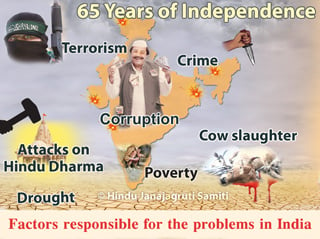
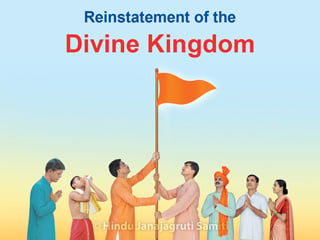 Ideal nation to be reinstated after the revolution - The Divine Kingdom
Ideal nation to be reinstated after the revolution - The Divine Kingdom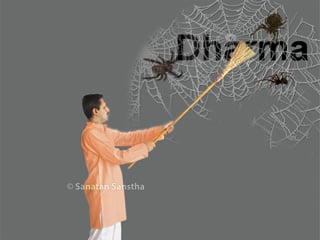 Religious Ignorance of Hindus and Pitiable State of Dharma (Righteousness)
Religious Ignorance of Hindus and Pitiable State of Dharma (Righteousness)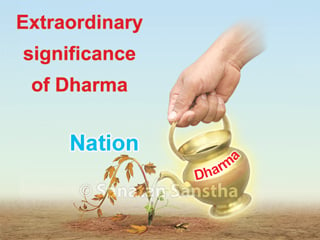 Extraordinary significance of Dharma (Righteousness) and Spirituality in social life
Extraordinary significance of Dharma (Righteousness) and Spirituality in social life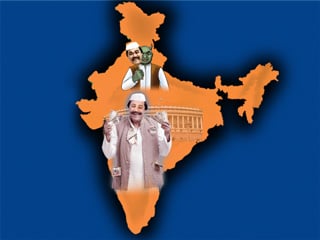 Current state of India - Nadir of deterioration
Current state of India - Nadir of deterioration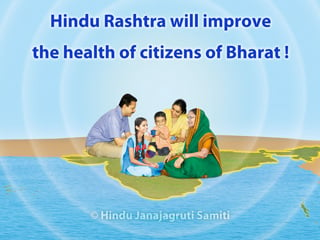 Hindu nation will improve the system of healthcare in India
Hindu nation will improve the system of healthcare in India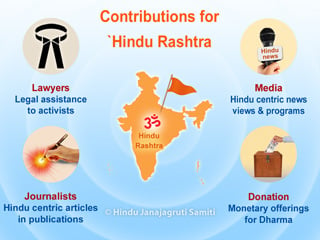 Need to contribute towards establishing the ‘Hindu Rashtra’
Need to contribute towards establishing the ‘Hindu Rashtra’